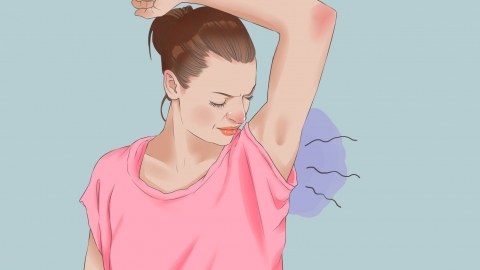How to completely eliminate body odor (bromhidrosis)
Generally, axillary bromhidrosis may be caused by genetic factors, excessive sweat secretion, local bacterial infection, hyperhidrosis, hyperthyroidism, and other factors. It is recommended to seek timely medical consultation, identify the underlying cause, and then eliminate the condition under a doctor's guidance through general treatments, medication, physical therapy, or surgical interventions. A detailed analysis is as follows:

1. Genetic factors: Axillary bromhidrosis has a clear genetic predisposition. When there are cases in the family history, the probability of offspring developing the condition is higher. This is due to genetically determined special sweat gland structures that tend to secrete sweat containing specific components. In daily life, it is important to bathe frequently, focusing on cleaning the armpits, and keeping them dry. Choose breathable, sweat-absorbing cotton clothing and change clothes regularly.
2. Excessive sweat secretion: In high-temperature environments, during intense physical activity, or when emotionally stressed, sweat glands in the armpits significantly increase sweat production. Excess sweat provides favorable conditions for bacterial growth, leading to odor. It is advisable to avoid prolonged exposure to high-temperature environments, reduce intense exercise, and promptly shower and change clothes after physical activity.
3. Local bacterial infection: Poor ventilation and inadequate cleaning of the armpits can lead to excessive bacterial proliferation, which breaks down organic substances in sweat into odor-causing unsaturated fatty acids. Follow medical advice to apply medications such as aluminum chloride solution, formaldehyde solution, or hexamethylenetetramine solution to the armpits to inhibit bacterial growth.
4. Hyperhidrosis: Abnormally overactive sweat glands in the armpits cause sweat secretion far beyond normal levels, intensifying odor and making it difficult to alleviate with routine hygiene measures. In addition to using the aforementioned antiperspirant and antibacterial medications, injection therapy may be performed under medical guidance, primarily using botulinum toxin type A injections to reduce sweat gland secretion by inhibiting acetylcholine release at nerve endings.
5. Hyperthyroidism: Excessive secretion of thyroid hormones accelerates bodily metabolism, increases sweat gland activity, and can trigger or worsen axillary bromhidrosis. Symptoms often include palpitations, hand tremors, and others. Follow medical advice to use medications such as methimazole tablets, propylthiouracil tablets, or propranolol hydrochloride tablets to control the condition and regulate thyroid hormone levels.
In daily life, regularly trim underarm hair to reduce bacterial adhesion, and maintain a positive mindset to avoid anxiety-induced sweat gland secretion. Through comprehensive treatment and care, axillary bromhidrosis can be effectively improved, enhancing overall quality of life.






